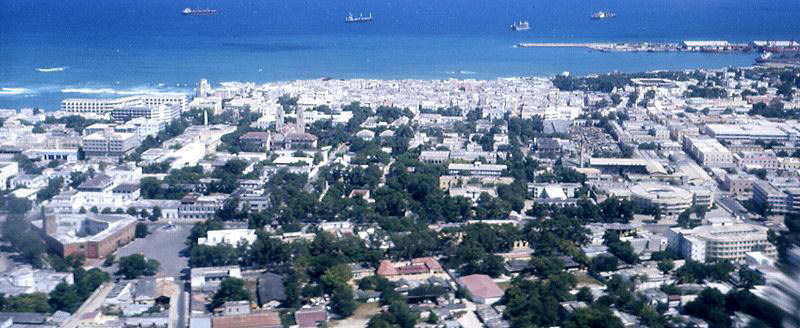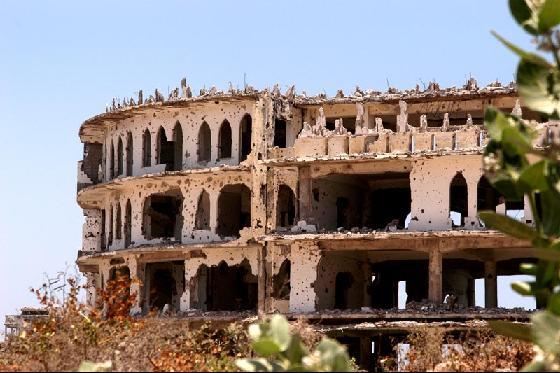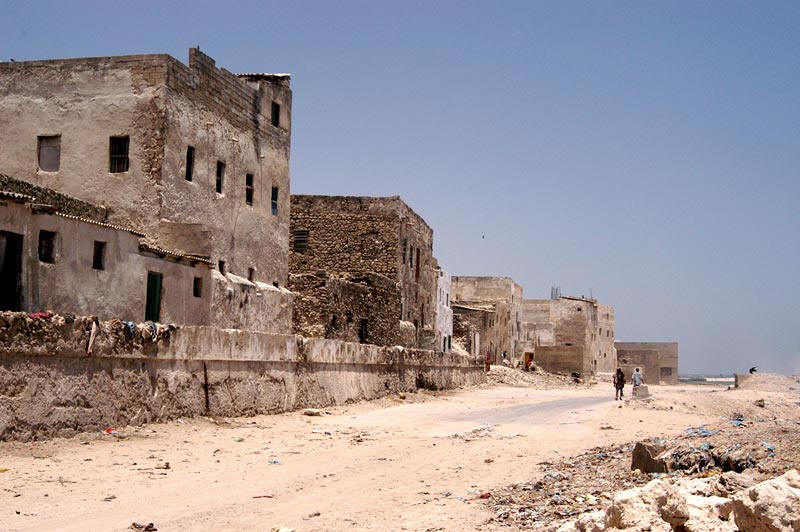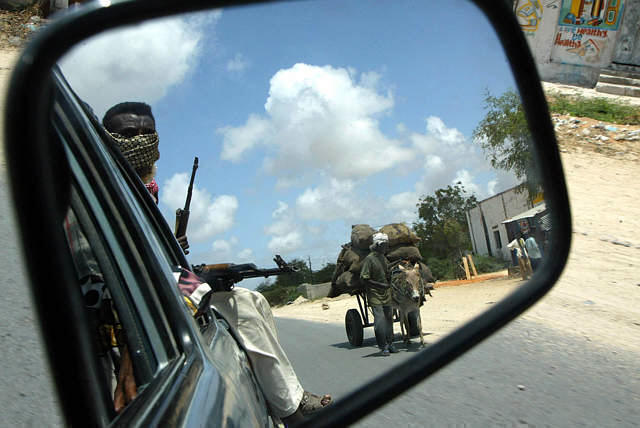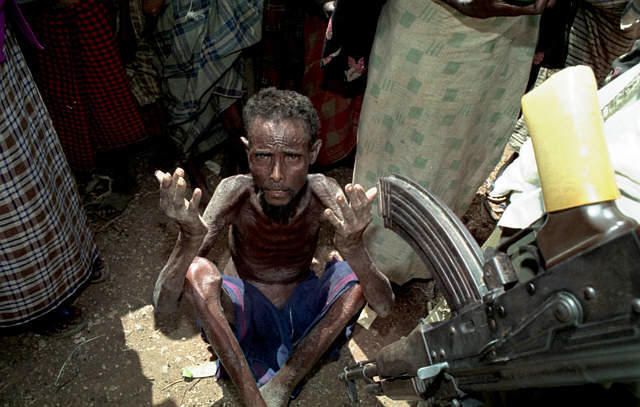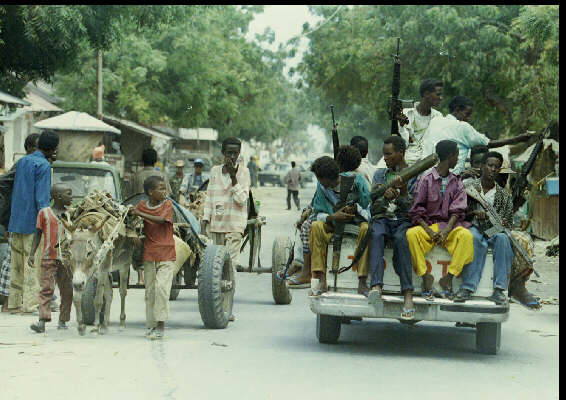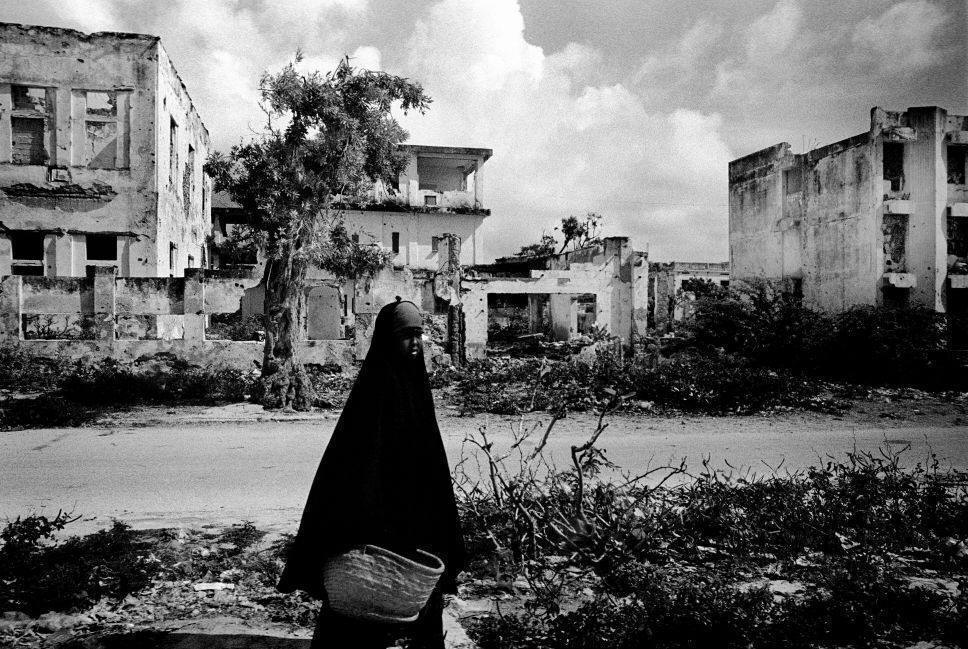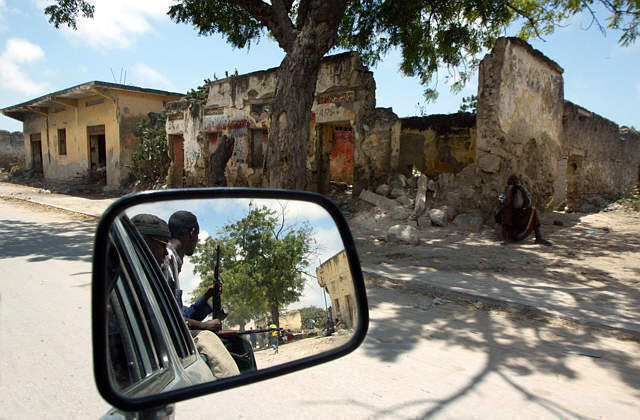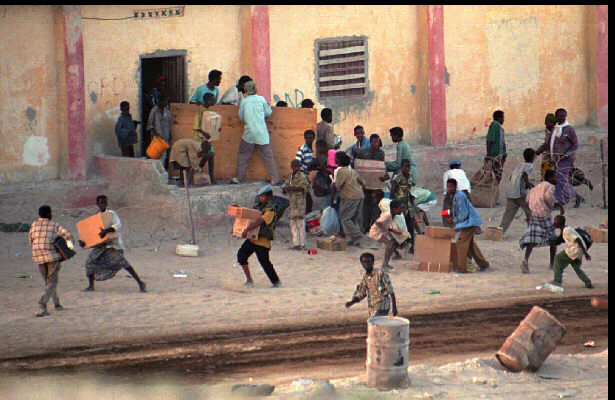On
Mogadishu's
'Green
Line,'
Nothing
Is
Sacred
By
DIANA
JEAN
SCHEMO
February
14, 1993
The New
York
Times
Mogadishu
Green
Line
MOGADISHU,
Somalia,
Feb. 13
-- The
clocks
at the
Cathedral
of the
Croce
del Sud
stopped
at 9:45.
The
cherubs
looked
ever
skyward
as fire
sent the
roof
crashing
in
shards
to the
floor.
White
spaces
where
gilded
crosses
once
hung
tell of
plunder,
and the
sepulchers
of the
bishops
remembered
only as
Zucchetto
and
Colombo
have
been
emptied.
The
remains
of the
bishops
may be
lost
somewhere
along
the
so-called
"green
line"
that
divides
northern
and
southern
Mogadishu
between
warring
factions.
The area
between
them has
become a
ghost
town,
haunted
by the
memories
of
splendor
and of
failure.
The
hopes of
the
one-time
residents
have
been
crushed
and
twisted
beyond
repair,
like the
metal
gates to
the
local
palaces
of
commerce,
art and
religion.
'It
Sparkled'
"Before
the
church
burned,
it had
beautiful
golden
colors,
and
colored
tiles,"
said
Tahlil
Omar
Hassan.
"It
sparkled
. . .
like New
York,"
offered
Abdi
Yare
Huyogo,
a
12-year-old
who
stood on
the
carpet
of
broken
tiles
nearby.
"It was
like
flowers,"
Abdul-Ahi
Ulo
Sahel
called
down
from the
perch
where he
hacked
away at
the
church's
remaining
beams
for
firewood.
"It had
gold and
brass.
It was
bella,
bella,"
he added
in the
Italian
that
still
peppers
the
Somali
language.
Long the
epicenter
of the
fight
between
two clan
militias
for
control
of the
Somali
capital,
the line
dividing
Mogadishu
is also
a
microcosm
of
Somalia's
past and
future.
Its
streets
are
littered
with the
fallen
monuments
of both
colonial
and
indigenous
masters;
its
bombed
and
ransacked
buildings
stand as
testimony
to the
latest
blood
rivalry
for
control.
The
United
States
Marines
at the
command
post at
the
one-time
Commercial
Bank of
Somalia
speak by
way of
comparison
of the
destruction
and
tension
in
Beirut
as they
patrol
Mogadishu.
But
Mohammed
Jirdeh
Hussein,
a Somali
businessman
whose
family
owns
several
office
buildings
along
the
dividing
line,
remembers
the days
before
the
fighting
started
and
looks
beyond
what is
lost to
what may
be. At
the
now-closed
Hotel
Croce
del Sud,
the
former
assistant
manager
and
receptionist
await
the
return
of the
owner,
an
Italian
named
Tomas
Briata.
Last
Spoke in
April
Mr.
Briata
last
spoke to
the men
in
April.
In a
call
from his
Padua,
Italy,
home to
the
Italian
consulate,
Mr.
Briata
told Ali
Mohammed
Roble,
the
receptionist,
and
Abdul
Rahman
Salam,
the
assistant
manager,
to watch
over the
hotel.
"We are
waiting
for him
to come,
and he
is
coming,"
said Mr.
Roble, a
50-year-old
who had
worked
in the
hotel
from the
age of
15.
There
are no
guests,
but Mr.
Roble
wears a
beige
safari
uniform.
He
sweeps
the
courtyard
where
cafe
tables
once
surrounded
the
fountain.
He shows
off the
hotel
rooms,
proud
that
only
three of
40 were
hit by
bombs.
"In
front of
our
hotel
there
were
trucks
firing,"
said Mr.
Salam.
"The
bandits
came
with
guns,
saying,
'Give us
all the
dollars
you have
saved
here.' "
"We'd
say we
didn't
have
dollars.
We don't
even
have
food,"
Mr.
Salam
recalled,
and
shuddered.
"So
they'd
take our
watches,
whatever
we had
in our
pockets."
Looters
took all
the
mattresses,
beds,
cutlery
and
linens.
No Pay
and No
Mail
The men,
as
desperate
as they
are
loyal,
have not
received
salaries
since
April.
There is
no mail
service
here.
The only
telephones
are the
satellite
phones
foreigners
bring,
and the
cost of
using
those is
exorbitant.
"Tell
Briata
we are
in this
condition,"
Mr.
Roble
said, as
he
unfolded
a paper
with the
owner's
phone
number.
"Tell
him of
our
sacrifice."
Mr.
Briata
left
Mogadishu
on an
Italian
military
plane,
after a
mob of
police
officers,
soldiers,
bandits
and
beggars
climbed
the
hotel's
walls on
a
looting
spree in
the last
days
before
the
final
fall of
Mohamed
Siad
Barre,
the
ousted
Somali
dictator.
Mr.
Briata,
his
employees
and the
handful
of
guests
fought
off the
intruders'
guns and
knives
with
machetes.
Mr.
Briata,
60 years
old at
the
time,
was
thrown
from the
hotel's
second-story
window
and
broke
two
vertebrae,
his
daughter-in-law,
Tracy
Briata,
said
from
Padua in
a
telephone
interview.
The
family
escaped,
but lost
computers,
paintings,
furniture
--
virtually
all its
personal
belongings,
she
said.
They
carried
no
suitcases
when
they
fled.
"I am
trying
desperately
to find
a way to
come
back,
but I
have no
money,"
Mr.
Briata
said in
halting
English
before
passing
the
phone to
his
daughter-in-law.
He said
he would
seek
other
investors,
or
perhaps
help
from the
Italian
government.
But most
of all,
he would
need to
know
that the
bloodletting
will not
begin
again.
Selling
the Past
Some
Somalis
are
beginning
to show
enterprise
again.
At the
foot of
the
Italianate
arch
erected
in the
center
of the
old city
in 1928
for a
visit by
Mussolini
that
never
materialized,
Aden
Sidou
Rage
ventured
to sell
a rare
prize:
glass
negatives
that
depict
these
streets
in the
1930's.
He kept
them in
a brown
plastic
pouch,
the kind
now used
for the
American
military's
field
rations.
The
photos
show men
in
fascist
uniforms
sipping
tea and
espresso
along
the
piazza
and at
the Cafe
Nazionale,
last a
camera
shop,
now a
mass of
concrete
debris.
The same
construction
boom
that
built
the arch
also
erected
the
Cathedral
of the
Croce
del Sud.
Named
for the
navigator's
polestar
of the
Southern
Hemisphere,
the
Cathedral
has been
stripped
nearly
bare.
The
plaques
praising
the
eternal
"strength
of the
Catholic
faith
and
Italian
virtue"
have
been
defaced
by the
graffiti:
"No
church
anymore,"
and,
"You
have to
believe
in the
existance
(sic.)
Of the
prophet
Mohammed"
are two
of the
slogans
in
English.
Three
men
stealing
what
remained
of the
wooden
beams
said
that
although
the
church
had been
splendid
in its
day, the
time for
cherubs
and
stained
glass
Virgins
was
over.
"The
church
already
burned,"
said
Hassan
Ali
Hassan.
"It's
finished."
They
said
they had
been
displaced
and
wanted
to sell
the
beams as
firewood.
Asked
why they
did not
cut
branches
from
trees,
Ali
Abukar
Osman, a
30-year-old
father
of two,
said the
trees
would be
needed
"later
on, for
fruit
and for
shade."
"We hope
the
church
will be
rebuilt
again,"
said Mr.
Hassan.
Then why
take it
apart?
"If it's
restored,
they'll
need to
take out
all the
burned
parts,"
Mr.
Osman
said,
and
laughed.
"We're
helping
with the
demolition."
Watched
the
Church
Burn
Mr.
Hussein,
the
Somali
businessman
whose
family
owns
property
along
the
"green
line,"
watched
the
church
and much
of the
rest of
the
neighborhood
burn
during
the
fighting
that
ousted
Mr. Siad
Barre
and
ultimately
hurled
the
country
into
anarchy.
"I
remember
the day
the
fighting
started,"
Mr.
Hussein
said.
"It was
December
26,
1990. I
called
my wife
and told
her the
fighting
had
begun.
"By 10
A.M. the
next
morning,
the
shooting
was on
again. I
told my
father
to go
home,"
he said.
"And we
never
opened
again."
Standing
amid a
sea of
charred
cashier's
checks
and
other
notes at
the
burned-out
hulk of
what was
once the
country's
central
bank,
Mr.
Hussein
said
that
everything
closed
-- "Not
just us,
the
whole
city."
Mr.
Hussein
said he
negotiated
with
local
militia
members
to spare
his
family's
complexes.
"It cost
a lot,"
he said.
"Not
only in
money,
but
physically,
being
through
so
much."
The
buildings
managed
to stay
largely
intact,
no minor
miracle
in this
city of
decay
and
destruction.
'You
Wait,
Totally
Impotent'
Time has
passed
excruciatingly
slowly
for Mr.
Hussein.
"You
wait,
totally
impotent,"
he said.
"You
can't
make
sense of
it. You
can't
stop
it." He
walked
over
streets
rippled
from the
tanks
that had
rolled
here,
and
looked
at the
new U.S.
Marine
checkpoint
nearby.
"This
was
really a
bolt
from the
blue,
and it's
just the
right
thing at
the
right
time,"
the
businessman
said.
"Because
we
couldn't
build up
on our
own. We
were
totally
destroyed."
But at
the
checkpoint,
where
the
sounds
of Phil
Collins
mix with
the
Koranic
chants
of
children
attending
school
again,
U.S.
Marine
Cpl.
Matthew
Banks
faced
ghosts
of his
own.
Reminders
of
Beirut
"When I
look at
this
place, I
see
Lebanon,"
he said.
"It
looks
just
like
Beirut."
He is
not the
only
marine
to
complain
of a
familiar
sinking
feeling
he first
knew
eight
years
ago,
when the
United
States
deployed
marines
in an
effort
to
establish
stability
in the
Lebanese
capital.
But they
ended up
pawns in
a
long-term
factional
battle,
with 241
killed.
"We're
constantly
reminded
of
Beirut,"
Corporal
Banks
said.
Before
they
came to
Somalia,
senior
officers
said
that the
rules of
engagement
in
Somalia
--
unlike
Beirut
-- would
allow
marines
to shoot
to kill
whenever
they
felt
their
lives
threatened.
But
Mogadishu
still
brings
memories
of
Beirut.
"I think
we're
getting
too
involved
in
something
we know
very
little
about,"
he said.
"This is
like
going
back
eight
years."
Map of
Somalia,
indicating
Mogadishu.
©
Copyright
1993 The
New York
Times
Company.
All
Rights
Reserved.
Somali
Violence
May
Delay
U.S.
Withdrawal
Daniel
Williams;
John
Lancaster
February
26, 1993
The
Washington
Post
An
upsurge
of
violence
in
Somalia
this
week has
prompted
U.S.
military
planners
to
consider
slowing
the
withdrawal
of U.S.
troops
and
leaving
a larger
number
of
combat
troops
in
Somalia
than
originally
planned,
U.S.
sources
said
yesterday.
The
possibility
of a
greater
U.S.
combat
presence
to
augment
a
planned
international
peacekeeping
force
under
United
Nations
command
raises
the
prospect
that the
United
States
may
attempt
to play
a more
significant
role in
maintaining
order in
Somalia
than
anticipated.
"I think
recent
events
indicate
that it
is going
to be a
lot more
difficult
to get
out of
Somalia,"
a senior
U.S.
military
officer
said.
"What
you'll
see is a
residual
force of
some
considerable
size for
an
extended
period."
For the
second
straight
day,
roving
bands of
Somali
gunmen
yesterday
defied
U.S. and
allied
troops
in
Mogadishu,
firing
on U.N.
offices,
the U.S.
diplomatic
mission,
foreign
relief
offices
and
hotels
housing
foreigners.
Three
U.S.
Marines
and two
Nigerian
soldiers
were
wounded
in
yesterday's
fighting.
Until
this
week's
outbreak
of
fighting
and
rioting,
the
Pentagon
expected
to begin
a
full-scale
withdrawal
in a
matter
of
weeks,
leaving
behind a
residual
contingent
of as
many as
5,000
U.S.
troops,
mainly
in
support
of a
larger
U.N.-led
force.
A senior
Pentagon
official
cautioned
yesterday
that no
decision
had been
made
about
increasing
this
longer-term
U.S.
commitment
to
Somalia,
but he
said the
option
would be
discussed
with
U.N.
officials
in talks
over the
timing
of the
U.S.
withdrawal
and the
size of
the
follow-on
force.
"We've
had
things
we're
prepared
to throw
on the
table,"
the
official
said,
adding
that to
leave
more
combat
troops
in the
country
is
"within
the
realm of
what
we're
prepared"
to
consider.
U.N.
Secretary
General
Boutros
Boutros-Ghali
said
late
yesterday
in New
York
that
unrest
will not
complicate
the
planned
transition
to a
U.N.
command,
in which
most of
the
17,000
remaining
American
servicemen
and
women
would go
home.
"I
believe
that the
situation
has been
very
much
exaggerated
. . .
and that
the U.N.
will be
able to
do our
transition
according
to the
schedule
which
has been
established,"
he told
the
Associated
Press.
Among
the
administration's
stated
objectives
in
intervening
in
Somalia
last
December
was
creation
of a
"secure
environment"
for
delivery
of food
to
starving
Somalis.
Such
security,
it was
hoped,
would
give
peaceable
political
activists
room to
emerge
from
under
the
shadow
of
militia
violence.
Yesterday,
U.S.
officials,
discussing
the
Somali
situation
privately,
said
they
expect
further
serious
outbreaks
of
violence.
As a
result,
they
also
expect
the
transition
to a
U.N.-led
peacekeeping
operation
will be
delayed
beyond
its
scheduled
completion
date in
mid-April.
Nonetheless,
some
officials
regarded
the
turmoil
as a
symptom
of
success,
not
failure.
Arms at
the
disposal
of
Somali
militias
have
been
reduced
by U.S.
raids on
arms
caches,
the
officials
said,
and
access
to new
weapons
is
hindered
by
foreign
control
of major
ports
and
roadways.
Clan
militias,
while a
threat
to each
other,
are no
match
for
troops
from the
United
States
and
other
countries
now in
place.
"The
warlords
are
getting
nervous,"
a State
Department
official
said.
"They
are
having
their
feathers
plucked.
They
realize
over
time
that
their
power is
slipping
away.
"But,"
he said,
"anybody
who
thinks
the U.N.
won't be
tested
doesn't
know
Somalia."
U.N.
forces
will
have to
"show
their
teeth"
to keep
the
volatile
Somali
militias
at bay,
the
official
added.
When
U.S.
troops
first
arrived
in
Somalia,
Boutros-Ghali
urged
them to
disarm
the
warring
clans
before
withdrawing.
American
military
commanders
declined
to
guarantee
full
disarmament,
although
several
raids on
arms
caches
took
place.
U.S.
officials
had been
critical
of the
United
Nations
for
slowness
in
recruiting
other
countries
to send
replacement
troops
and
naming a
military
commander
to head
the U.N.
force. A
Turkish
general
has
since
been
picked
to take
command.
About
17,000
U.S.
soldiers
are in
Somalia
along
with
about
14,500
troops
from 21
other
countries.
The
number
of non-U.S.
troops
has been
expected
to grow
to about
20,000.
A U.S.
military
official
said
yesterday
that
Somalia
is
currently
too
unstable
for U.N.
peacekeepers,
who have
a
reputation
for
passivity
under
fire.
"We have
an
unstable
situation
in
Mogadishu
and in
just
about
all the
other
towns,"
said a
senior
officer
with
access
to
classified
intelligence
reports.
"I think
what
we're
seeing
now is
what we
were
afraid
was
going to
happen.
"I can't
see how
it would
facilitate"
the
transfer
of
operational
control
to the
United
Nations,
he
added.
Each day
of
reduced
U.S.
troop
strength,
however,
creates
a
problem
for
American
forces
left
behind,
he said.
"Whether
we go in
there
and
enforce
peace is
very
much a
function
of
whether
you've
got the
troops
over
there to
do it,"
he said.
For the
moment,
delivery
of
humanitarian
relief,
the
primary
objective
of the
U.S.
intervention,
is at a
standstill.
Moreover,
the
American
goal of
getting
unarmed
Somalis
to take
the
political
lead in
the
tumultuous
country
is in
doubt
with the
assertion
this
week of
gun-barrel
authority
by
Mohamed
Farrah
Aideed,
a
militia
commander
in
Mogadishu
who
aspires
to
supreme
power.
Periodic
negotiations
among
Somali
leaders
have
proceeded
slowly,
and no
results
are
expected
anytime
soon.
Aideed's
outburst
is
unlikely
to
encourage
unarmed
Somalis
to talk
freely,
especially
if they
oppose
Aideed's
ambitions.
"Alternative
leadership
will not
come out
unless
there is
evidence
they are
not at
the
mercy of
warlords,"
said
Terrence
Lyons,
an
analyst
at the
Brookings
Institute
here.
The
emergence
of such
leaders
will
take
time but
an
American
preoccupation
with a
speedy
withdrawal
had
given
the
impression
that
U.S.
interest
in
Somalia
is
limited.
When
then-President
George
Bush
announced
the
dispatch
of U.S
troops
to the
east
African
country,
Pentagon
officials
said
most of
the
forces
would
likely
be home
by the
spring.
"Americans
like to
think we
can roll
up our
sleeves,
set
things
right
and get
out. But
the only
way to
foster
what we
want - a
government
accepted
by the
Somalis
- will
take
time,"
said I.
William
Zartman,
an
expert
on
conflict
resolution
and
director
of
African
Studies
at the
Johns
Hopkins
University
School
of
Advanced
International
Studies.
©
(Copyright
1993)
Ali
Mahdi
Terms
Latest
Fighting
"Most
Savage"
London
BBC
World
Service
in
English
1515 GMT
February
17, 1992
[From
the
"Focus
on
Africa"
program]
[Text]
The
presence
in
Somalia
of a
United
Nations
relief
team
appears
to have
had no
effect
on the
two
factions
battling
for
control
of the
capital,
Mogadishu.
Although
representatives
of
Interim
President
Ali
Mahdi
Mohamed
and his.
rival,
General
Aidid,
signed a
cease�fire
agreement
in New
York
last
Friday
[14
February],
the
shelling
of
residential
areas is
continuing,
taking a
heavy
toll in
civilian
lives.
Earlier
today,
Ali
Mahdi
Mohamed
told a
press
conference
in
Mogadishu
about
the
latest
fighting.
Sayid
Baha was
there
and
telexed
us this
report:
[Begin
studio
announcer
recording]
Speaking
to
journal�ists
at his
residence
at (Kaaraan),
Ali
Mahdi
described
the last
five
days of
fighting
as the
most
savage
since
fighting
broke
out last
November
between
the two
factions
of the
United
Somali
Congress.
He said
an
estimated
800
people
have
been
killed
and
several
hundred
injured
in the
last
five
days.
Ali
Mahdi
accused
Gen.
Aidid of
deliberately
starting
the new
upsurge
in
violence
in a bid
to
undermine
the
United
Nations
peace
process.
He said
Gen.
Aidid
has on
numerous
occasions
explicitly
rejected
several
UN
cease-fire
offers
and very
much
doubted
whether
he would
respect
the
recently
con�cluded
UN-sponsored
peace
plan.
Commenting
on the
war
situation,
Mr.
Mahdi
said
that the
war was
continuing
in many
parts of
the city
with
both
sides
using
heavy
artillery.
He said,
and I
quote: I
very
much
regret
the loss
of life
of
innocent
people,
particularly
when
there is
not a
glimmer
of hope
for
peace.
When
asked
about
the
claims
of Gen.
Aidid
that the
general's
forces
had
captured
his
official
residence,
he
smiled
and told
journalists
that
they
were
attending
a press
conference
at his
official
residence
and that
they
could be
the
judge of
the
general's
claims.
[end
recording]
"Sporadic
Shelling"
Reported
in
Mogadishu
Paris
AFP in
English
1020 GMT
February
18, 1992
[By
David
Chazan]
[Excerpt]
Nairobi,
Feb 18 (AFP)-Sporadic
shelling
shook
some
Mogadishu
districts
Tuesday,
but
fighting
seemed
to have
died
down
after a
day of
heavy
artillery
duels in
the
north of
the
Somali
capital,
relief
officials
said
here.
The
officials,
in radio
contact
with
Mogadishu,
said
occasional
shelling
was
still to
be heard
around
the
Kaaraan,
Shibis
and
Yaaqshid
neighbourhoods.
Mogadishu
has been
wracked
by
fierce
fighting
in the
past
five
days
despite
a
U.N.-brokered
truce
agreed
by
representatives
of the
main two
rival
factions
in New
York
last
Friday
[14
February].
U.N.
officials
who had
discussed
relief
operations
with one
of the
warlords,
General
Mohamed
Farah
Aidid,
were
unable
Monday
to fly
over the
chaotic
and
divided
city to
meet his
opponent,
interim
President
Ali
Mahdi
Mohamed,
because
of
fierce
fighting
around
an
airstrip
used by
Ali
Mahdi.
Relief
officials
were
increasingly
pessimistic
about
the
chances
of
halting
the
carnage
in
Mogadishu,
which
has
killed
up to
5,000
people
in the
past
three
months.
Some of
the
fighting
was over
food,
which
has
grown
increasingly
scarce
and
outrageously
expensive
where
available.
The
International
Committee
of the
Red
Cross
estimates
that 4.5
million
of the
arid
East
African
country's
eight
million
people
risk
famine.
The two
factions
control
no more
than
about
4,000 of
the
estimated
20,000
well-armed
youths
roaming
Mogad�ishu
streets,
according
to
military
experts
in the
region.
Somalia
as UN
departs:
A future
of doubt
Sense of
lawlessness
prevails
as
foreigners
prepare
to go
Tom
Ashbrook
February
15, 1995
The
Boston
Globe
MOGADISHU,
Somalia
-- Mog,
they
call it.
Rhymes
with
rogue. A
short,
soldier's
nickname
for a
hard
place,
like Nam
for
Vietnam.
Mog.
Short
for
something
too bad
to fully
name.
The big
UN
transport
planes
carrying
passengers
in from
Kenya
like to
come in
over the
ocean,
away
from the
red
desert
and
shell-pocked
casbah
alleyways
and
cranked-up
guys
with
great,
long
guns.
Fewer
problems
that
way.
"It's
not
dangerous,"
shouted
a
British
cameraman
above
the din
of the
plane's
big
engines
early
one
recent
morning.
He
pulled a
tall
bottle
of
Finlandia
vodka
from his
knapsack
and took
a long
draw.
Mog.
"The
Somalis
are a
magnificent
people,
full of
pride
and
dignity,"
effused
a young
Euro-relief
worker
no
longer
in
Somalia.
"In
Somalia,
every
man is a
king.
And
every
woman a
queen."
Oh, yes.
But of
what?
Driving
past the
last
United
Nations
guards
at the
fortified
airport
gate
feels
like a
sudden,
dusty
lurch
into
time
travel.
Past or
future
depends
on your
outlook.
Optimistic?
Then
this is
surely
the
past,
grimy
and
violent
and
wrapped
in rags
and
waiting
to be
swept
away.
Dirty
children
crawl on
the
airport
gate. A
mob of
mangy
donkeys
pulling
water
barrels
crowds a
roadside
pipe,
waiting
to fill
up and
deliver
door-to-door.
In the
right
part of
town,
you can
hear the
tok-tok
of
wooden
camel
bells at
work.
For
centuries,
Mogadishu
has been
a
coastal
trading
cousin
of Lamu
and
Zanzibar,
and you
can
still
feel a
lingering
Arabian
Nights
magic in
its
surviving
minarets,
archways
and
crests
of blown
sand
that lip
in over
doorsteps.
Yes,
this is
surely
the
past:
African
coastal
city
under
siege,
circa
1520.
Pessimistic?
Then
this is
the
future.
Welcome
to Blade
Runner-type
anarchy,
where a
rocket-propelled
grenade
launcher
seems to
rest on
every
tenth
threadbare
shoulder,
grounded
nomads
live in
urban
huts
made of
garbage
and the
only
telephone
service
is by
satellite.
Good ol'
clan
boys
with
AK-47s
on their
laps sit
through
long,
hot
afternoons
getting
pumped
chewing
khat
leaves
flown in
from the
base of
Kilimanjaro
and
joking
thinly
about
whom
they
could
grab for
ransom
tonight.
If
you're
looking
for it,
there's
devolution
in every
crumbling
wall and
distant
mortar
round.
"The UN
is
leaving.
Things
are
winding
down and
people
here
want to
maximize
their
profits,"
said a
UN
staffer
with a
wink,
warning
wryly to
watch
out for
roving
kidnappers.
Somalis
know
they
have no
choice
but to
get by
on a bad
block in
the
global
village.
One way
and
another,
they
live and
even
hope.
Sometimes,
gifts
show up.
Late
last
month, a
Ukranian
ship,
Captain
Smirnoff,
pulled
into the
Mogadishu
port
from
Mombasa,
its
decks
jammed
with 100
Japanese
cars for
sale, at
$2,000 a
pop.
The town
was
electrified.
It's a
long way
to the
nearest
dealership.
In Mog
terms,
this was
a
first-class
auto-expo.
Banana
trucks
were
cleared
out off
the
wharf
and the
buying
began.
The cars
were
gone in
one day
-- each
purchased
with
cash,
manned
with
gunmen
and
whisked
into the
back
streets.
There
are
other
good
omens.
Mohamed
Farrah
Aidid,
the
warlord
who
thumbed
his nose
at US
troops
and
lived to
tell the
tale, is
said to
be down
on his
luck.
And that
seems to
be fine
by most
Somalis.
Aidid
made his
first
fortune
by
stripping
Somalia
of every
speck of
metal he
could
lay
hands on
and
selling
it,
which is
murder
on a
nation's
infrastructure.
Then he
found a
patron
in the
old
Somali
millionaire
who used
to run
Conoco's
oil
exploration
here.
But the
old
patron
stepped
on a
mine,
got his
heels
blown
off and
lost his
zest for
war. And
some of
the wind
has gone
out of
Aidid's
sails.
"Better
for us,"
said a
Mogadishu
businessman
hoping
for
fewer
warlords
and more
peace
and
quiet
and
business
deals.
It's
time now
to ship
sheep
and
goats to
Saudi
Arabia
for
pilgrims
heading
to
Mecca.
"And we
have
lobsters.
Plenty
of good
lobsters,"
said the
businessman.
"Do you
think
they
would
sell in
Boston?"
In the
United
States,
where
night
skies
are
often
overlit
and
hazy,
Muslims
learn of
the
crescent
moon
that
announces
the
beginning
of
Ramadan
by
telephone
chain.
In
Mogadishu
there is
no
possibility
of that,
and no
need.
The
city's
few
lights
are
powered
by
private
generators.
The
night
sky is
dark and
full of
stars.
On the
night
Ramadan
began,
the sun
dropped
over
Africa
and, in
no time,
a
perfect
crescent
moon
rose
over the
city,
with a
perfect
twinkling
star off
its toe.
It could
be seen
from any
rooftop.
Small
green
lights
blinked
on
around
minaret
towers.
Muezzins
droned
their
call to
prayer
in a low
hum of
loudspeakers.
In the
dark
waters
offshore,
the
ships of
a
gathering
flotilla
waited
to take
UN
troops
away and
leave
Somalis
to
settle
their
own
affairs.
In the
dark
homes of
Mogadishu,
Somalis
also
waited.
©
1995 New
York
Times
Company.
